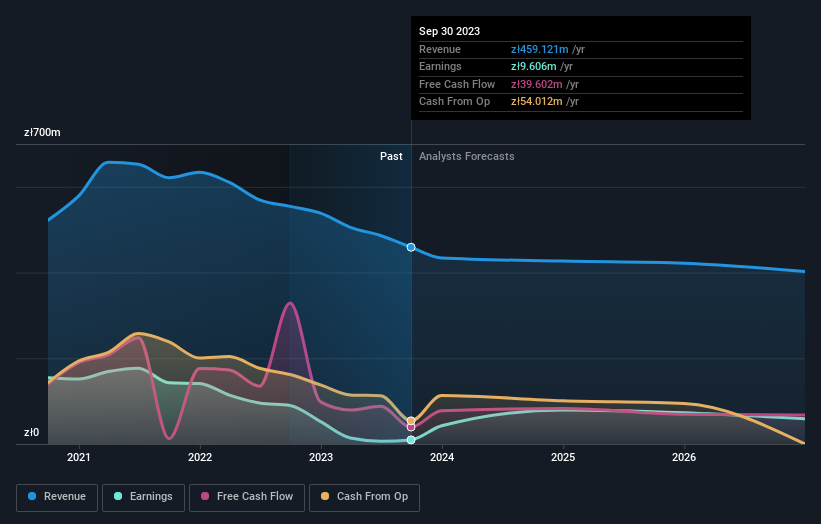- Poland
- /
- Entertainment
- /
- WSE:TEN
individual investors who own 59% along with institutions invested in Ten Square Games S.A. (WSE:TEN) saw increase in their holdings value last week

Key Insights
- Significant control over Ten Square Games by individual investors implies that the general public has more power to influence management and governance-related decisions
- 41% of the business is held by the top 25 shareholders
- Insiders own 15% of Ten Square Games
To get a sense of who is truly in control of Ten Square Games S.A. (WSE:TEN), it is important to understand the ownership structure of the business. We can see that individual investors own the lion's share in the company with 59% ownership. That is, the group stands to benefit the most if the stock rises (or lose the most if there is a downturn).
While individual investors were the group that reaped the most benefits after last week’s 10% price gain, institutions also received a 26% cut.
In the chart below, we zoom in on the different ownership groups of Ten Square Games.
Check out our latest analysis for Ten Square Games

What Does The Institutional Ownership Tell Us About Ten Square Games?
Institutions typically measure themselves against a benchmark when reporting to their own investors, so they often become more enthusiastic about a stock once it's included in a major index. We would expect most companies to have some institutions on the register, especially if they are growing.
Ten Square Games already has institutions on the share registry. Indeed, they own a respectable stake in the company. This implies the analysts working for those institutions have looked at the stock and they like it. But just like anyone else, they could be wrong. If multiple institutions change their view on a stock at the same time, you could see the share price drop fast. It's therefore worth looking at Ten Square Games' earnings history below. Of course, the future is what really matters.

Ten Square Games is not owned by hedge funds. Arkadiusz Pernal is currently the company's largest shareholder with 9.1% of shares outstanding. With 7.2% and 6.7% of the shares outstanding respectively, Goldman Sachs Asset Management, L.P. and Allianz Asset Management GmbH are the second and third largest shareholders.
Our studies suggest that the top 25 shareholders collectively control less than half of the company's shares, meaning that the company's shares are widely disseminated and there is no dominant shareholder.
Researching institutional ownership is a good way to gauge and filter a stock's expected performance. The same can be achieved by studying analyst sentiments. There are plenty of analysts covering the stock, so it might be worth seeing what they are forecasting, too.
Insider Ownership Of Ten Square Games
The definition of an insider can differ slightly between different countries, but members of the board of directors always count. Company management run the business, but the CEO will answer to the board, even if he or she is a member of it.
I generally consider insider ownership to be a good thing. However, on some occasions it makes it more difficult for other shareholders to hold the board accountable for decisions.
It seems insiders own a significant proportion of Ten Square Games S.A.. Insiders own zł108m worth of shares in the zł737m company. We would say this shows alignment with shareholders, but it is worth noting that the company is still quite small; some insiders may have founded the business. You can click here to see if those insiders have been buying or selling.
General Public Ownership
The general public, who are usually individual investors, hold a substantial 59% stake in Ten Square Games, suggesting it is a fairly popular stock. With this amount of ownership, retail investors can collectively play a role in decisions that affect shareholder returns, such as dividend policies and the appointment of directors. They can also exercise the power to vote on acquisitions or mergers that may not improve profitability.
Next Steps:
While it is well worth considering the different groups that own a company, there are other factors that are even more important. To that end, you should learn about the 3 warning signs we've spotted with Ten Square Games (including 1 which shouldn't be ignored) .
If you would prefer discover what analysts are predicting in terms of future growth, do not miss this free report on analyst forecasts.
NB: Figures in this article are calculated using data from the last twelve months, which refer to the 12-month period ending on the last date of the month the financial statement is dated. This may not be consistent with full year annual report figures.
Valuation is complex, but we're here to simplify it.
Discover if Ten Square Games might be undervalued or overvalued with our detailed analysis, featuring fair value estimates, potential risks, dividends, insider trades, and its financial condition.
Access Free AnalysisHave feedback on this article? Concerned about the content? Get in touch with us directly. Alternatively, email editorial-team (at) simplywallst.com.
This article by Simply Wall St is general in nature. We provide commentary based on historical data and analyst forecasts only using an unbiased methodology and our articles are not intended to be financial advice. It does not constitute a recommendation to buy or sell any stock, and does not take account of your objectives, or your financial situation. We aim to bring you long-term focused analysis driven by fundamental data. Note that our analysis may not factor in the latest price-sensitive company announcements or qualitative material. Simply Wall St has no position in any stocks mentioned.
About WSE:TEN
Very undervalued with flawless balance sheet.


